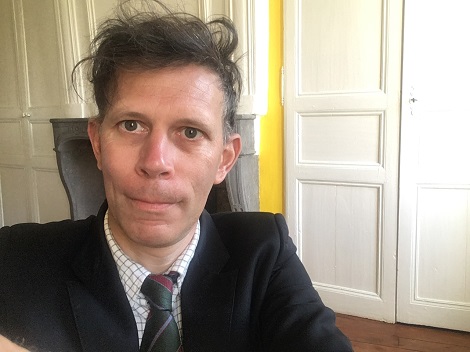Dr Thomas Flichy de La Neuville on Geopolitics and Asian Studies
On September 21, 2021, a delegation from an accredited Business School of Rennes (France) visited HSE campus in Saint Petersburg to sign a partnership agreement and discuss future plans for international academic mobility and exchange programmes. On September 24, Dr. Thomas Flichy de La Neuville, Head of the Master's Program in Geopolitics and Business, met with the first-year students of the Master's program in Business and Politics Modern Asia at the Higher School of Economics.

Professor Thomas Flichy de La Neuville is Associate Professor in Strategy and Innovation Academic Area, Rennes School of Business (France). He is a historian who is focused on current conflicts, effects of geopolitical events on business, elites, characters and education, history of innovation and cultures and negotiation.
Why are you interested in geopolitics, war study and innovation/strategy?
As a historian, I focused on one particular aspect of the history of civilizations: how do they transmit life. What is their degree of liveliness? In effect, the main effort of a civilization consists in transmitting economic, cultural, political, and spiritual life. By focusing on this particular aspect, I have noted the importance of the creative minorities within a society. But these minorities must also be able to maintain peace. Innovation and strategy are thus intimately linked to one another: the living elites have in effect two qualities: imagination and courage. They must be able to respond to challenges thanks to their creativity and at the same time able to maintain the population united.
You have an academic background of Law and History. How does it help you in politics research? For young students in politics and international relations, how should they connect history and tradition to modern politics?
The combined study of history and law give us an advantage: thanks to history, we are able to step back and to behave with more intelligence. In effect Cliopolitics, the use of history in order to take an economic or political decision remains fundamental for young leaders. On the other hand, the study of the great legal systems, the way in which they interact and fight against one another gives us an idea of the underground political tensions in the world. For big companies, normalization represents a huge challenge. What country will decide the norms? Young students of international relations should have one foot in history and the other in new technologies. They have to connect the direct testimonies of those who see the latest changes in international relations to the classics.
What are the advantages of Asian study and geopolitics study based on your background?
On the Eurasian continent, I am a specialist of Iran. I am aware of the tremendous changes this country is currently undergoing because I have spent time there and met its populations. At the same time, I am aware of its historical continuities throughout history. As a French academic, I am also aware of the specific connections this country had with France.
In your opinion, for Asian study in Russian circles, what are the differences and specific features?
The main difference is that Russia being partially Asian, Asian studies are an interrogation on Russia’s own self. For us, things are a little bit different: Asia is far away from us, even though we invested emotionally and politically in the Indochinese peninsula.
You have publications about discussion of the strategic position of Iran in the related area. How do you expect Iranian transformation during Biden rule? What are possible opportunities and challenges for Russia?
The Middle East is marked by a strong opposition between Iran and Saudi Arabia. Saudi Arabia funded the campaign of Trump, it is now weakened by the election of Joe Biden. This president will reopen discussions with Iran but on a limited basis. For structural reasons, the United States will maintain Iran in confinement. They are indeed very much afraid of its imagination.
Middle East is always hot spot in international relations, and currently we still see the humanitarian tragedy in Yemen and Syria. How do related countries find a kind of appropriate balance between superpower interference and national self-determination?
The natural order of the world consists in a division into Nations. Of course, Empires appear from time to time, however their military offensives usually correspond to a time of internal collapse. Alexander the Great conquered Persia while the Greek cities were declining. As a consequence, imperial interferences in the Middle East should be seen as a sign of weakness and coming collapse. The contemporary empires often make the following mistake: they consider that high technology can be substituted to political intelligence. This mistake is pretty common amongst technocracies.
Would you please recommend some scholars or publications about international relations, to young students in this area?
For Iran, read the travels of Jean Chardin in Persia. His remarks are very helpful in order to understand the mentalities. Have also a look at the books of Bernard Hourcade, who is a geographer specialized in Iran. Then travel there.

